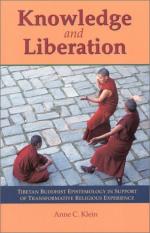|
This section contains 4,165 words (approx. 14 pages at 300 words per page) |

|
For Buddhist thinkers philosophy should aid one in eliminating suffering and obtaining happiness. They maintain that to achieve those ends, one must eliminate ignorance (avidyā), a fundamental mental flaw that is suffering's basic cause. Although variously construed ignorance inevitably involves the mistaken belief that a fixed, unchanging personal essence, or ātman, lies at the core of each person's identity. Hence, to eliminate ignorance one must eradicate that belief, and to do so Buddhist philosophers stress the importance of seeing things as they are (yathābhūtadarśana), a corrective cognitive state through which one knows that persons necessarily lack essence. The need to give an account of such a state leads to a concern with epistemology in Buddhist thought from its earliest period (500 BCE–100 CE) in South Asia.
Although early Buddhism evinces a nascent epistemology, precise and sophisticated accounts of knowledge do not begin until adequate...
|
This section contains 4,165 words (approx. 14 pages at 300 words per page) |

|


